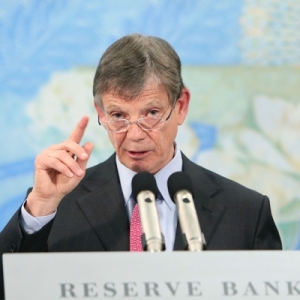The exchange rate is unjustified and unsustainable and could tumble, says the Reserve Bank Governor Graeme Wheeler.
Wheeler says the exchange rate is susceptible to a significant downward adjustment.
He says the bank will welcome a move towards a more sustainable exchange rate level.
The high exchange rate has been a sticking point for exporters. However, the value of the Kiwi dollar has dropped sharply in recent months- from US88c in July to around US80c this week.
In a statement today, Wheeler said that, when assessing the implications of current strength or weakness in the New Zealand dollar, the Bank focuses on two broad concepts – whether the exchange rate is unjustified, and whether it is unsustainable.
The level of the exchange rate is unjustified when it is inconsistent with the economic factors that typically explain its movement during the business cycle. It is unsustainable when it deviates from its long-run equilibrium level, where it would be expected to settle when business cycle factors have fully dissipated.
"The Bank's analysis indicates that the real exchange rate is well above its sustainable level, and also above levels justified by short-term business cycle factors," Wheeler says.
"Unjustified and unsustainable are important considerations in assessing whether exchange rate intervention is feasible. Another consideration is whether conditions in the foreign exchange markets are conducive to intervention having an impact on the exchange rate.
"The real exchange rate has not adjusted materially to the recent downward movement in commodity prices."
For example, global dairy prices have fallen by 45% since February 2014. Despite this, in August, New Zealand's real effective exchange rate was 1% higher than its February 2014 level.
Wheeler says that past experience suggests that, when the New Zealand dollar begins declining from an unjustified and unsustainable level, the ultimate adjustment can be large.



















